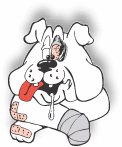|
Osteoarthritis is
a chronic, slowly progressing condition that is caused by the breakdown and destruction of your pet's cartilage. As that occurs, the bony structures begin to rub against one another causing arthritis pain and discomfort.
-
Inflammation causes an increase of oxygen, calcium, phosphates and carbonates in the inflamed area. When this happens calcium-phosphate and calcium-carbonate are formed (osteoarthritis) in the area.
-
Old age
-
Genetic tendency
-
Wear and tear on the joints
-
Ligament, tendon, or muscle disease, e.g., ruptured anterior cruciate ligament
-
Fractures involving the joint
-
Developmental disorders, e.g., hip dysplasia, elbow dysplasia, osteochondritis dissecans, Legg-Perthes disease
-
Congenital disorders, e.g., Wobbler's syndrome (cervical
spondylomyelopathy), luxated patella
-
Dietary and hormonal disease, e.g., hyperparathyroidism, obesity
-
Metabolic disorders, e.g., von Willebrand's disease
(haemophilia) in dogs
-
Degenerative joint disease (osteoarthritis)
-
Inflammatory joint disease, e.g., Lyme disease, rheumatoid arthritis
-
Degenerative spinal joint disease, e.g., intervertebral disc disease, cauda equina syndrome
-
By consuming milk products.
We are the only species that purposely continues to drink milk after weaning from mothers milk. It might make sense if we continued to consume human milk. It is the perfect diet for a human child. Cow's milk is the perfect diet for a calf who will weigh in at 500 pounds by the time they are a year old. The reason cow's milk is white is because it is literally liquid bone with other nutrients and antibodies included.
Cow's milk is an excellent source of calcium. Unfortunately, it is also an excellent source of phosphates. When the two are combined in a highly oxygenated area, like an area of inflammation, and the highly oxygenated area in the arteries (aorta, coronary, carotids, etc.),
calcium-phosphate occurs. In one area we call it osteoarthritis, in the other we call it hardening of the arteries. The life expectancy of a dairy farmer is 55 years. Hardening of the arteries causes high blood pressure, strokes, and heart attacks.
A pet suffering from arthritis pain, a degenerative
osteoarthritis of joints like the hips, spine, knees and elbows, responds to osteoarthritis treatment like liquid glucosamine chondroitin, quickly and
favourably. If your pet has difficulty climbing stairs jumping on the bed or going for long walks, you need to consider dog arthritis medication. Approximately 25-30% of family pets suffer from dog arthritis, osteoarthritis. Broadly described by most veterinarians as DJD (degenerative joint disease), dog arthritis is just as painful and debilitating as it is for people.
Besides sports injuries, osteoarthritis in dogs may be caused by bacterial infections in the joint, and most commonly, growing abnormalities in the joint.
The signs of dog arthritis are:
-
Reluctance to walk, climb stairs, jump, or play
-
Limping
-
Lagging behind on walks
-
Difficulty rising from a resting position
-
Yelping in pain when touched
-
A personality change
-
Resistant to touch
Recommended::
LECITHIN GRANULES - Found in health food stores. The liquid form of lecithin found in
gelatine capsules is not strong enough to work. Lecithin acts as a chelating agent. It has a stronger affinity for
calcium, a weak metal, than phosphates and carbonates. Lecithin removes the calcium allowing the phosphate and carbonate to float free again from the arthritic spot or hardened artery.
DIRECTIONS
-
Feed your adult horse 5 tablespoons a day for 30 days and STOP!!
-
Feed your 25 pound dog 1/4 teaspoon a day for 30 days and STOP!!
-
Feed your 50 pound dog 1/2 teaspoon a day for 30 days and STOP!!
-
Feed your 100 pound dog 1 teaspoon a day for 30 days and STOP!!
Once you have fed you horse or dog lecithin granules for 30 days then give them the same dose once a week for life. If you were to continue feeding your pet a daily portion of lecithin granules beyond the 30 days, the skeletal system would begin to decalcify after 80 or 90 days. 30 days is all they need. This will help prevent
osteoarthritis, and hardening of the arteries from reforming without changing their diets. |
